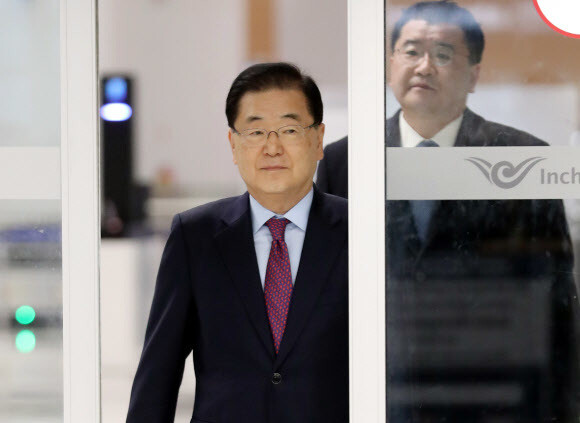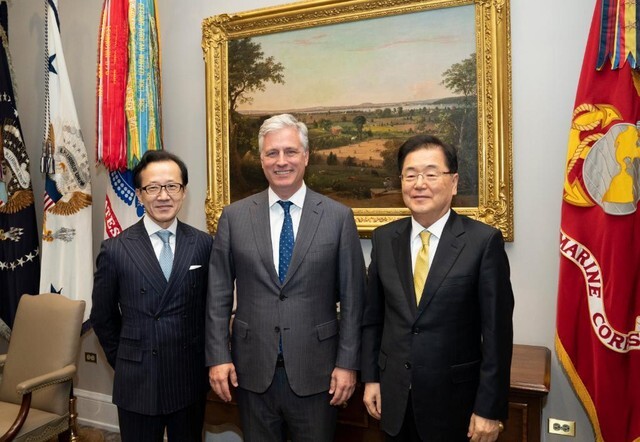hankyoreh
Links to other country sites 다른 나라 사이트 링크
Chung Eui-yong says US didn’t directly mention Strait of Hormuz deployment during Washington visit

Blue House National Security Office Director Chung Eui-yong, who returned to South Korea on Jan. 10 from Washington after holding high-level security talks with the US and Japan and meeting with US President Donald Trump, said that the US hadn’t made any “direct mention” of the question of deploying military forces to the Strait of Hormuz, but said he did receive a “detailed briefing from the Americans about the current situation in the Middle East.”
“The proposed deployment to the Strait of Hormuz is about protecting the safety of our citizens and our companies. We intend to contribute to international efforts to ensure safety and free navigation, but we’re still considering how we should go about doing that,” Chung went on to say.
The Hormuz deployment is also expected to be a major issue on the agenda of a meeting between South Korean Foreign Minister Kang Kyung-wha and US Secretary of State Mike Pompeo to be held in San Francisco on Jan. 14.
Plans have nearly been finalized for a trilateral foreign ministers’ meeting in the same period, in which Kang and Pompeo will sit down with Japanese Foreign Minister Toshimitsu Motegi. While the immediate fears of war, triggered by the targeted killing of top Iranian general Qasem Soleimani, have subsided for now, tensions remain, and the US is gradually increasing its calls for South Korea and Japan to join its coalition against Iran.
While the South Korean government has been seriously considering the option of deploying forces to the Strait of Hormuz by sending ships from the anti-piracy Cheonghae Unit, which has operated in the Gulf of Aden, the intensifying conflict between the US and Iran has prompted calls for caution. Given the difficulty of accurately ascertaining how this tense situation will develop, some think that Seoul needs to take as much time as possible to make a prudent decision.

“There’s a considerable risk of the tensions between the US and Iran dragging on and of pro-Iran militant groups, rather than Iran’s regular army, attacking US or US-allied facilities in the Middle East,” said an official in the South Korean government.
Since Japan has already decided to send a ship to the Middle East, some argue that South Korea has no choice but to join the coalition, given the importance of its alliance with the US. However, the situation in Japan is quite different from that in South Korea. Japan’s decision to deploy a ship conforms to Prime Minister Shinzo Abe’s political ambition of broadening the scope of activity of the Japan Self-Defense Forces, to extricate Japan from the limitations of its “Peace Constitution.” South Korea, in contrast, has to reckon with the fact that many more of its citizens and companies are operating in Iran and other parts of the Middle East.
“It’s only natural for the US to ask [for deployment], but there are 1,600 Koreans in Iraq and 290 in Iran. Our top priority is the safety of our citizens,” a senior official at South Korea’s Ministry of Foreign Affairs told reporters on Jan. 9.
By Park Min-hee and Seong Yeon-cheol, staff reporters
Please direct comments or questions to [english@hani.co.kr]
Editorial・opinion
![[Column] Season 2 of special prosecutor probe may be coming to Korea soon [Column] Season 2 of special prosecutor probe may be coming to Korea soon](https://flexible.img.hani.co.kr/flexible/normal/500/300/imgdb/original/2024/0426/3317141030699447.jpg) [Column] Season 2 of special prosecutor probe may be coming to Korea soon
[Column] Season 2 of special prosecutor probe may be coming to Korea soon![[Column] Park Geun-hye déjà vu in Yoon Suk-yeol [Column] Park Geun-hye déjà vu in Yoon Suk-yeol](https://flexible.img.hani.co.kr/flexible/normal/500/300/imgdb/original/2024/0424/651713945113788.jpg) [Column] Park Geun-hye déjà vu in Yoon Suk-yeol
[Column] Park Geun-hye déjà vu in Yoon Suk-yeol- [Editorial] New weight of N. Korea’s nuclear threats makes dialogue all the more urgent
- [Guest essay] The real reason Korea’s new right wants to dub Rhee a founding father
- [Column] ‘Choson’: Is it time we start referring to N. Korea in its own terms?
- [Editorial] Japan’s rewriting of history with Korea has gone too far
- [Column] The president’s questionable capacity for dialogue
- [Column] Are chaebol firms just pizza pies for families to divvy up as they please?
- [Column] Has Korea, too, crossed the Rubicon on China?
- [Correspondent’s column] In Japan’s alliance with US, echoes of its past alliances with UK
Most viewed articles
- 1AI is catching up with humans at a ‘shocking’ rate
- 21 in 5 unwed Korean women want child-free life, study shows
- 3Korea’s 1.3% growth in Q1 signals ‘textbook’ return to growth, says government
- 4Division commander ordered troops to enter raging flood waters before Marine died, survivor says
- 5[Column] Park Geun-hye déjà vu in Yoon Suk-yeol
- 6[Column] Season 2 of special prosecutor probe may be coming to Korea soon
- 7Marriages nosedived 40% over last 10 years in Korea, a factor in low birth rate
- 8[Column] Has Korea, too, crossed the Rubicon on China?
- 9‘Weddingflation’ breaks the bank for Korean couples-to-be
- 10Is Japan about to snatch control of Line messenger from Korea’s Naver?